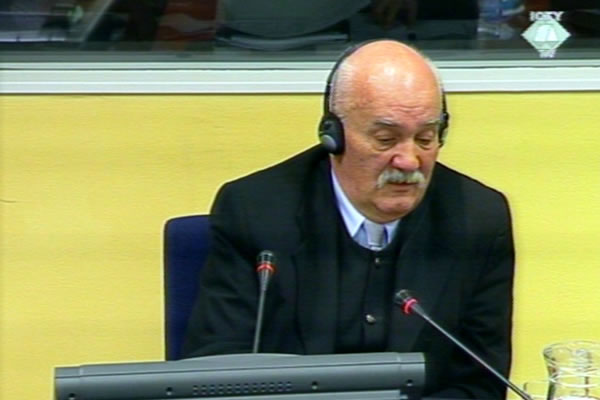Home
COUNTERINTELLIGENCE SERVICE AGENT OR BALKAN SPY
The defense of Jovica Stanisic and Franko Simatovic today cross-examined prosecution witness Slobodan Lazarevic, paying less attention to his claims about the role of the accused in Krajina from 1991 to 1995, and focusing instead on trying to impeach the witness and prove that he had misrepresented himself as an agent of the Counterintelligence Service of the former JNA and VJ
 Slobodan Lazarevic, witness at the Jovica Stanisic i Franko Simatovic trial
Slobodan Lazarevic, witness at the Jovica Stanisic i Franko Simatovic trial The defense of the former Serbian State Security Service chiefs, Jovica Stanisic and Franko Simatovic, cross-examined prosecution witness Slobodan Lazarevic, trying to prove that he had misrepresented himself as an agent of the JNA Counterintelligence Service. The defense argued that witness’s claims about the role of the two accused in Krajina and BH were not accurate. In his examination yesterday, the witness maintained that the Serbian State Security Service controlled the situation in RSK from 1991 to 1995; the police and paramilitary units from Serbia committed numerous crimes against the local non-Serb population in that period there.
Stanisic’s counsel Jordash first asked the witness if anybody apart from his contact in the KOS leadership – an officer by the name of Zimonja – could confirm that he had indeed been a military intelligence officer. Lazarevic said that he had worked with other members of the military intelligence, but he didn’t know their names. Lazarevic urged the defense to contact Zimonja. When it was put to the witness that at least some of those with whom he had worked in Krajina had to know that he was a military agent, the witness said that it was not the kind of information one would like to broadcast.
Jordash suggested that Lazarevic’s claims about Stanisic’s control over Tosa Pajic, one of most powerful police officers in Krajina, were not true. Asked to provide more details on their relationship, the witness said that it was not his job to deal with the police, but the army and the international representatives. The witness stuck to his claim that Pajic had called Slobodan Milosevic ‘boss’, and after talking to Stanisic over the phone, he would say ‘it was dad on the phone’.
In his attempt to contest Lazarevic’s spy CV, Simatovic’s defense counsel contended that the witness had forged several documents he gave to the OTP to prove he had really served as an intelligence officer in Krajina. One of the documents is a certificate of his assignment to the 21st Corps in Kordun, signed by its commander Cedo Bulat. The defense argued that the documents were clearly forgeries: there was a stamp of the VJ 40th Personnel Center next to Bulat’s signature. The 40th Personnel Center was in charge of providing support to the Krajina Serb army. The witness was adamant that he had received the document from Bulat after the war. He never looked at the stamp, he added. The defense went on to claim that Lazarevic forged even his own official ID card from the time he was in Krajina as it didn’t look like other documents issued by the Krajina police. Lazarevic explained that the ID cards issued by the MUP were different from those issued in the field, like his.
Simatovic’s defense counsel Bakrac also challenged the witness’s claim that he had left Serbia in 1999 for political reasons. Bakrac suggested that the witness had in fact left because criminal charges were pressed against him for fraud in the sale of apartments in Portugal to Serbian citizens. The issue was discussed in closed session. Slobodan Milosevic had also focused on the same topic in his cross-examination of Slobodan Lazarevic.
The prosecution didn’t seem too upset with the outcome of the cross-examination, as there was no attempt to rehabilitate the witness through re-examination.
Linked Reports
- Case : Stanisic & Simatovic
- 2010-02-08 ‘INTERNATIONAL UNIT’ OF THE SERBIAN STATE SECURITY
- 2010-02-04 WHO PLAYED KEY ROLE IN CRIMES IN SAMAC?
- 2010-02-03 ‘MASTERS OF LIFE AND DEATH’
- 2010-03-12 PROSECUTION: FRANKO SIMATOVIC IS INTIMIDATING WITNESSES
- 2010-03-22 STANISIC DEMANDS ‘DESERVED RESPITE’
- 2010-04-12 ‘SPECIAL’ OPERATIONS OF STATE SECURITY UNITS IN BARANJA
